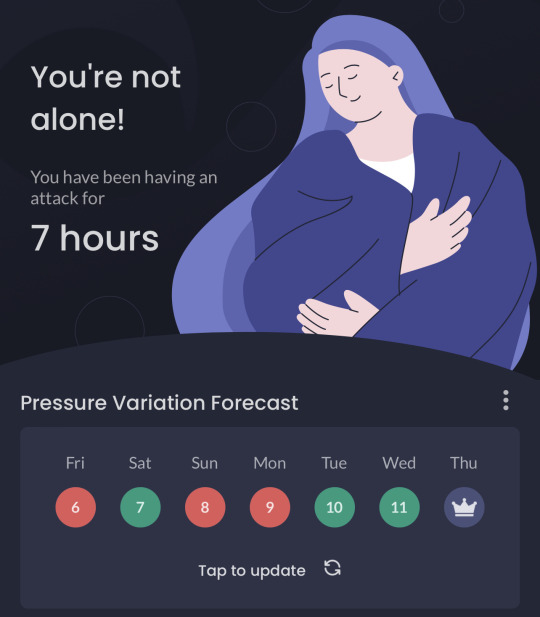#chronic migraine disorder
Text
I’ve been sick for about ten years and there hasn’t been a day my chronic illness hasn’t gone out of it’s way to humble me
Like no I don’t have a ego I faint when I stand to fast and my worst enemy is water consumption
#gastroparesis#amps#amplified musculoskeletal pain syndrome#pots syndrome#posturaltachycardiasyndrome#fibromyalgia#chronic migraine#chronic migraine disorder#chronic illness#spoonie#out of spoons
96 notes
·
View notes
Text
Just thinking about the common experience of late diagnosed disabled people of “the normal amount of pain is none” and how we’re just supposed to know that despite *some* level of pain being OUR normal for our entire lives, even if it’s usually not super bad it’s just always there.
Thinking about how, when I told my mother this, she asked me “So what’s hurt?” Which is very different than “what hurts?”
I looked at her, confused. “Nothing is hurt. I just hurt.”
And she says “But where do you hurt?”
“Well, right now it’s my stomach and my ankles-“
She cuts me off. “So you twisted your ankle?”
“No,” I say. “My ankles just hurt. I’ve been walking today.”
Now it’s her turn to look confused. “Just walking doesn’t make your ankles hurt. You must have sprained them or something.”
But I shake my head. “Nope. This just happens on days when I walk more than a little bit. My ankles hurt first, then my knees by lunch time. And if I don’t take a nap and stay on my feet all day, my hips will be hurting too.”
“Oh.”
Joint pain is my normal. Sometimes, if I barely walk all day, the ache in my ankles is barely noticeable and doesn’t affect my functioning because I’m used to it. If I do what most able-bodied people would consider to be a “normal” amount of walking, almost all of my joints will hurt by supper. If I have to wash dishes or run any errands, I’ll hurt so bad I can’t walk for the rest of the day.
Then there’s the chronic migraine attacks. I used to have them multiple times a week as a child, and no matter how I explained myself, nobody ever understood that they weren’t just headaches. I experienced those too, and frequently, but they were not the same. Thankfully, at the age of eleven, I found an article explaining migraine triggers. I was able to identify a few of my own triggers, and the frequency of my migraine attacks reduced to maybe a couple a month. For a few years I was basically on cloud nine, I’d never experienced such a lack of pain before and it was so freeing. Unfortunately, migraine is a progressive condition, so the attacks have gotten more frequent over the years.
And then there’s the “random” pains. Some mornings I wake up and my stomach hurts. Or my chest. Or my back. These are just things I have to live with, because my body’s connective tissue is… well, for lack of a better word, faulty. And I never knew that other people didn’t experience this, because how could I? We never talked about it. Sometimes I’d hear people complain about back aches and just assume they were like mine. Of course, I knew that injuring yourself could cause muscle aches, obviously. But I just assumed that *most* of the time, other peoples bodies hurt like mine did. I didn’t realize that humans aren’t supposed to “just hurt” without a connected incident.
And when I try to explain this to able bodied people, their response is always the same. “Well, everyone’s back hurts sometimes.” “Everybody gets headaches sometimes.” “You’re not special just because you’re too lazy to walk. I still go to work when I don’t feel good.” And no matter how many times I try to say that No, you don’t get it, I *always* hurt, they still brush me off and dismiss me.
#connective tissue disorder#hypermobilty syndrome#joint pain#migraine#chronic migraine#migraine attack#invisible disability#spoonie#disabled#disability rant#nightramblestm
3K notes
·
View notes
Text
Normalise mourning the life you may have had before chronic illness took over.
#chronically ill#chronic pain#migraine#disability#disabilties#functional neurological disorder#fibromyalgia#spoonies unite#spoonie strong#spoon theory#chronic fatigue#chronic illness#chronic migraine#spoonie struggle
716 notes
·
View notes
Text
I cannot fight for my health and fight the world at the same f**king time.
#melody morningdew art#disabled#degenerative disease#undiagnosed chronic illness#undiagnosed disability#tic disorder#neurodivergencies#diagnosis#disability#undiagnosed chronic pain#chronically fatigued#chronic migraine#chronic disability#chronically ill#chronic illness#so fucking tired#fibromyalgia#hypermobile eds#multiple sclerosis#ms#dysautomnia#pots#no spoons#spoonie#medical gaslighting#medical trauma#angry disableds#low spoons#part time wheelchair user#autism
577 notes
·
View notes
Text

I made it to 31 days migraine-free until last night my neck adjusted and pinched a nerve. It’s not too bad. I took a Tylenol to take the edge off, something which was previously unheard of for me. Normally no amount of otc painkillers helped.
There’s also likely a hormonal fluctuation at play. My menstrual cycle is due, and that monthly spike in hormones always makes my hEDS so much worse. Hence my neck adjusting by itself and cronching the nerve. Which was honestly more painful than the migraine itself has been.
Part of having binocular vision disorder is constantly tilting your head from side to side to try and keep your eyes in focus.
Since getting my glasses, I’ve been “weirdly still.” I still fidget and move because ADHD, but I’m no longer doing a constant “confused puppy” impersonation as I tilt my head from side to side to keep my eyes in focus.
I’m realizing now that this has likely greatly helped my craniocervical instability, and I’ve not been pinching the nerves in my neck so much.
If this is true, and my hormones become my main trigger—both for the migraine itself but also contributing to other factors like joint laxity and worsening my craniocervical instability—then that means I can better target my physical therapy, but also take preemptive precautions in the week running up to my monthly cycle and brace my neck to prevent the joints from moving around as much and pinching the nerves.
This is another potentially life altering revelation and I’m not even mad my 31 day streak got interrupted. Because I had 31 days migraine-free and that’s something I haven’t been able to say in over a decade, and if it comes to it, I’ll gladly take 1 migraine a month vs 20.
Anyway. I’m going back to sleep for a bit. I just had to jot this thought down in case the migraine gets worse and I forget.
2K notes
·
View notes
Text
Interesting notes from the latest Migraine World Summit email re: 'Is Migraine a Progressive Disease?'
I asked my neuro about brain damage caused by migraine once, and was told it doesn't damage the brain.
I don't know. I certainly FEEL like it's been damaged - I feel like my powers of cognition and everything else, for that matter, have degraded since my migraines became chronic, and it's coming up on 9 years constantly now, so there's been plenty of time for damage to occur, if any.
That said, how much of that is actual damage to the physical mass of the brain, and how much is just the effect of constant persistent pain causing oversensitive nerves?
So, things I found out:
Just 1% of the population (I'm assuming in the US) have chronic migraine
there's a subset of episodic migraine called 'high frequency episodic migraine' which involves 8-14 migraine days per month; this'd be a stage in between episodic migraine and chronic migraine
research shows disability caused by migraine has increased, but that could just be because they've changed the way the studies are done - does that information really mean anything then? Disappointing
functional changes in the brain can be seen, more prominently in people in chronic migraine than episodic migraine
these changes include affected areas of pain processing (which we knew) but also more iron accumulation??? I don't know what that means, but what?
they also suspect there's more happening in our metabolisms because of all the nerve firing off, which, yeah, makes sense.
and another thing we knew already, it's best to get treatment sooner rather than later; the longer migraine goes untreated, the more sensitization in the pain pathways increases
Maybe some interesting new stuff in there for people who have chronic migraines.
For everyone else who comes by this and DOESN'T have chronic migraine, I hope I can leave you with this:
Migraine Isn't A Headache.
#migraine isn't a headache#neurological cascade disorder#chronic migraines#migraines#headache#spoonies#chronic pain
186 notes
·
View notes
Text
I still see the lightning bolt disability pride flag (the one with the zigzag-shaped non-bg part) being used occassionally.
Your reminder that it can *kill* people with epilepsy, as well as hurt those with other kinds of photosensitivity (I'm autistic and have chronic migraines, I can't look at it)
The creator was alerted of that and has long since made a photosensitivity-friendly redesign. It is also open to further edits. Her tumblr is capricorn-0mnikorn, she has the flag in her pinned, but just in case, perhaps also will draw attention more, I'll add it here too:

[Image description, copied from the creator's original post:
A “Straight Diagonal” version of the Disability Pride Flag: A charcoal grey flag with a diagonal band from the top left to bottom right corner, made up of five parallel stripes in red, gold, pale grey, blue, and green
/End image description]
#psa#disability#neurological disability#neurologically disabled#neurological disorder#epilepsy#autism#migraines#photosensitivity#accessibility#leviathan.txt#described#disability pride flag#disability pride#pride flags#important#chronic migraines
525 notes
·
View notes
Text
Shout out to disabled people who are, ya know, existing with symptoms - whatever they may be. Who are exhausted/fatigued some (or all) days. Who are in pain. Who live in a world that doesn’t understand them, a world that isn’t built for them.
I hope you have the time to cuddle your favorite stuffed animal. I hope you watch an amazing episode of your favorite show. I hope you meet a doctor that smiles and sees you and works with you. Much love to you all.
#chronic illness#autoimmine disease#autoimmune#chronic fatigue#spoonie#chronic pain#spoonie life#chronic migraine#sjogrenssyndrome#raynauds#postural orthostatic tachycardia syndrome#erythromelalgia#nerve pain#gastroparesis#tmj disorder#disabled#ableism#disability
2K notes
·
View notes
Text
I want to talk about migraine and mobility aids.
I’ve made a post on Tourette’s and mobility aids so I’m going to talk about another neurological disability I have that is a reason me and many others use mobility aids. Migraine.
Migraine is a neurological disease that causes migraine attacks that are most known for causing headaches but not every attack will have a headache, migraine attacks come with many different symptoms some of which may cause someone to use mobility aids.
Some symptoms that may cause someone with migraine to use one or multiple mobility aids are
Vertigo
Vision changes
Weakness
Pain
Pain worsened when moving
Fatigue
Dizziness
Nausea which can be worsened by moving
Those symptoms and others may cause someone with migraine to use mobility aids. Everyone is different, not everyone with migraine uses mobility aids and those who do may use different ones for different symptoms.
One person may use different mobility aids depending on the day, situation, symptoms, severity of symptoms, ect.
#cpunk#cripple punk#queer cripple#disabled#physically disabled#neurological disorder#disability#neurological disability#migraine#chronic migraine#migraine attack#mobility aid#mobility aids#disabilties#disability aids
191 notes
·
View notes
Text
The scariest thing about being chronically ill and waiting to figure out wtf is wrong with you is dealing with scary symptoms you don’t know is just a symptom or something else that’s really serious. The anxiety from that itself is debilitating. My body feel like a torture device that I will never escape.
#chronic disability#chronic migraine#chronic inflammation#chronic illness#chronic pain#im scared#invisible disability#disabilties#disabled#dissociative identity disorder#did system#physical illness#disabled creator#disabled artist
289 notes
·
View notes
Text
So my other post has kinda died in terms of traction so here is a new one! Hi my name is Sierra I'm 27, bisexual, mixed race, very physical disabled, mentally ill and I need help to get my teeth removed and to get new teeth! Here is everything super condensed! I have a connective tissue disorder and am unable to work, along with this came chronic nausea, vomitting, and cyclical vomitting which had completely destroyed my teeth. It's incredibly hard to eat and is so embarrassing I do not leave the house without a mask if I leave at all. I'm going to regret this but under the cut you will see any actual photos of what my teeth look like today Any help you can give would be so so appreciated! Including reblogs! They help more than you know!
Here are other places you can donate! c@$happ: $sierrarose111
Ven!mo:sierrarose111
P@yP@|:[email protected]
Thank you so much for reading! If you wanna help your local disabled headed of the big titty committee I would really appreciate it 😊 If you are unable to donate reblogs are appreciated just as much!! I am definitely going to regret this but photo of my teeth is under the cut. Viewer Discretion Advised and all that

#Ehlers-Danlos Syndrome#Ehlers-Danlos#Ehlers Danlos Syndrome#Disability#Disabled#Connective Tissue Disorder#POTS#Postural Orthostatic Tachycardia Syndrome#Postural Orthostatic Tachycardia#Cripple Punk#Anxiety#PTSD#Depression#OCD#IBS#Abdominal Migraines#Migraines#Nausea#Vomiting#Chronic Vomiting#Cyclical Vomiting#Recurrent Dislocations#Dislocations#Sublexations#Sublex
536 notes
·
View notes
Text
I'm just like harry du bois as I also have to take magnesium and occasionally get called a faggot by children
35 notes
·
View notes
Text
i hate you ehlers-danlos syndrome i hate you pots i hate you chronic migraines i hate you brainstem auras i hate you central nervous system complications i hate you degenerative disc disease i hate you hypotension i hate you osteoarthritis i hate you fibromyalgia i hate you tmj disorder i hate you carpal tunnel i hate you mcas
#mood#sigh#i am having a day#disability#chronic illness#chronic pain#ehlers-danlos syndrome#dysautonomia#postural orthostatic tachycardia syndrome#migraines#chronic migraines#brainstem aura migraines#central nervous system#degenerative disc disease#hypotension#osteoarthritis#fibromyalgia#tmj disorder#carpal tunnel#mast cell activation syndrome#okay to reblog
245 notes
·
View notes
Text
I love being told that the help I'm given means I owe something to the person who helped me 🙃 Like don't help me, then.

#unconditional love is a thing#don't help me if you're going to hold a debt over my head thanks#disabled#chronic illness#chronically ill#chronic pain#chronic disability#chronically fatigued#fibromyalgia#undiagnosed chronic pain#melody morningdew art#undiagnosed chronic illness#disabled blog#disabled blogger#chronic migraines#chronic migraine#chronic fatigue#undiagnosed something#undiagnosed disability#ibs c#invisible disability#invisible illness#i hate living#kms#physical disability#tic disorder#post traumatic stress disorder#pots maybe#pots#hypermobile ehlers danlos
59 notes
·
View notes
Text
I’ve got my follow up neuro eye appointment on the 13th (my birthday!). I’m interested to see what a difference the glasses and vision therapy might have made in the last 2 months from his perspective.
For me it’s been pretty stark. I’ve only had 5 migraines this year.
This time last year, by March 2nd, I’d had 36.
520 notes
·
View notes
Text
Chronic migraine isn't a headache
I feel like, when we say 'a migraine is not a headache', people think 'it's not just a headache, it's also nausea and vomiting and being groggy' but it's not even that.
Migraine is not a headache, in that you don't have to have a headache to have migraines.
Not that I blame anyone - if you Google 'What is a migraine?', the NHS, Mayo clinic, etc, will always tell you 'migraine is a headache…' with additional add-ons.
Doctors get an entire 4 hours of medical training on 'headache' in their entire 7 years of education. Of course 'migraine is a headache' will be trotted out - headache is the most common symptom, and the one that bothers people the most.
It's understandable, but wrong.
Check out what you get from places with a migraine speciality, like the migraine trust and the national migraine centre:
'Migraine is a disorder of the brain where the nerves become over-stimulated and cause a cascade of chemicals to be released'
'Migraine brains' are easily overstimulated in response to sensory input (light, sounds, movement, smells, etc), of which headache is a product. Also nausea, vomiting, sensitivity to stimuli, vestibular dysfunction, sometimes stroke-like symptoms.
If that sounds a little like a neurodivergency to you, then yeah, it is.
Migraine is not 'a bad headache' and if you're getting them chronically, you should think about seeing a doctor* (or asking them for a referral to a headache doctor, or at least a neurologist)
'Chronic' Migraine is defined by:
at least 15 headache days a month
with 8 having migraine symptoms
for at least 3 months
(IF YOU HAVE CHRONIC MIGRAINE, YOU ALSO HAVE CHRONIC PAIN)
Otherwise it's 'episodic migraine' (although recent research indicates this defintion might be changing to be less restrictive, based on impact on the individual)
Migraine can become worse and less responsive to treatment the longer they go without treatment, so it's always worth seeing a doctor*, even if you're not having enough to be considered chronic.
Just as you can have migraines without headache, you can also have headaches without migraines that still require treatment. There's a whole host of differential diagnosis for migraine, from tension headache to cluster headache, idiopathic intracranial hypertension, hypertension, sinus disorders, trigeminal neuralgia, and on and on.
NB: Chiari malformations can also mimic migraines sometimes, by causing symptoms that come along with migraines, like neck pain, unsteadiness, dizziness, etc.
Migraines 'not just a headache'? Migraines aren't even a headache.
*usual caveat on seeing doctors; yeah, they cost money (in the US and/or privately elsewhere), long waiting lists, a lot of them A LOT OF THEM are incompetent, YMMV, but it's worth it for migraines.
#migraine#chronic migraine#chronic pain#disabilities#disability#headaches#neurodivergence#neurological disorder#spoonies#migraine isn't a headache
301 notes
·
View notes